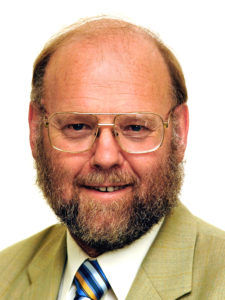

OBITUARY
Published date: 10 Sep 2023
Professor Sir Ian Wilmut
Professor Sir Ian Wilmut, leader of the team that created Dolly the Sheep, has died at age 79.
The creation of Dolly the Sheep at the University of Edinburgh's Roslin Institute in 1996 was the first time a mammal had been cloned from an adult somatic cell. Previously, it was believed that cloning could only be achieved with embryonic cells.
'Science has lost a household name' said Professor Bruce Whitelaw, director of the Roslin Institute. 'Ian led the research team that produced the first cloned mammal in Dolly. This animal has had such a positive impact on how society engages with science, and how scientists engage with society. His legacy drives so many exciting applications emerging from animal and human biology research.'
Professor Wilmut's early work focused on the cryopreservation of semen and embryos. He received his doctorate from Darwin College, Cambridge, in animal genetic engineering in 1971. He remained in Cambridge, spending two years as a post-doctoral fellow at the Unit of Reproductive Physiology and Biochemistry, where he was part of the team that created Frostie, the first calf born from a frozen embryo in 1973. That same year, he became a senior scientific officer at the Animal Breeding Research Organisation (which would become the Roslin Institute in 1993).
Professor Wilmut was also actively engaged in policy discussions related to his work, asserting that his research would not lead to any form of human cloning. In 2006, he co-authored a book, 'After Dolly: The Uses and Misuses of Human Cloning,' with Dr Roger Highfield, science director of the Science Museum Group. Both Professor Wilmut and Dr Highfield participated in a conversation at the Progress Educational Trust's 2017 conference, about the media's reaction to his work and lessons that can be learned today (see BioNews 884).
After Dolly, Professor Wilmut turned his focus to regenerative medicine and stem cells until his retirement in 2012. Following his diagnosis with Parkinson's disease in 2018, he became a patron for a research programme that supports new trials developing therapies to slow the progression of the disease.
